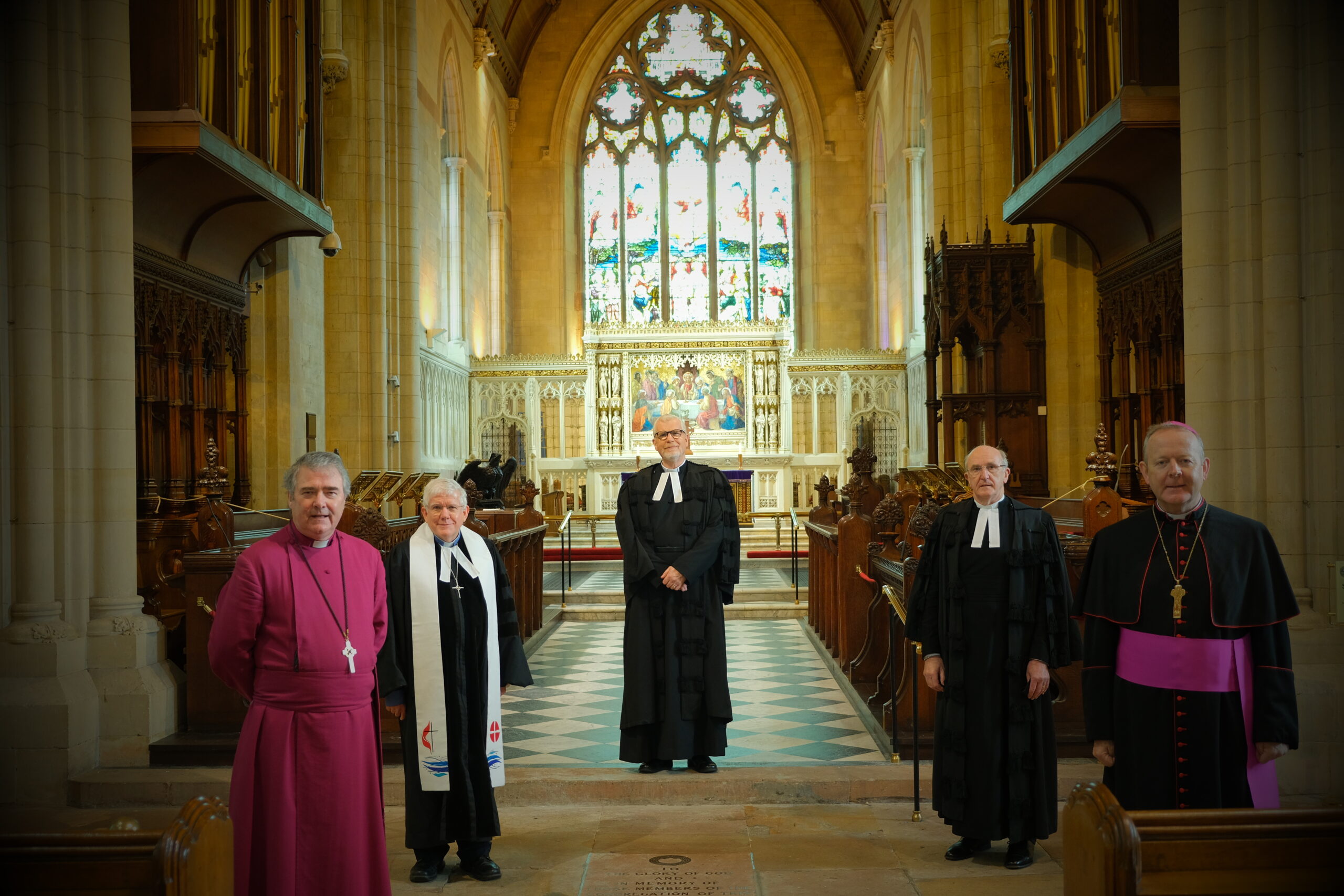Church Leaders’ St Patrick’s Day Message
‘In Christ We Journey Together’
The leaders of Ireland’s main churches have come together to issue a message on St Patrick’s Day that reflects on the 1921 centenaries and contains an invitation to wider civic society for further dialogue. Entitled ‘In Christ We Journey Together’, the theme chosen by the Church Leaders Group (Ireland) for their shared reflection on the centenaries, they recognise that some may struggle with idea of a shared history of the centenaries. Together, however, they explore how the Christian faith and Christian social ethics can contribute to the healing of relationships and offer a hopeful vision for the future.
In their Joint Statement, which they also filmed as a video message at Saint Patrick’s Church of Ireland Cathedral in Armagh, the Church Leaders welcome the progress that has been made through the peace process in building relationships of mutual respect and trust across these islands. While acknowledging that there is much work still to do, they set out a vision for a society where different identities in a pluralist public square can be valued.
Reflecting together, the Church Leaders placed particular emphasis on the interconnectedness of the people of the UK and Ireland, saying ‘What is undeniable … is the reality that we have to live in a shared space on these islands, and to make them a place of belonging and welcome for all’. They have chosen to issue their message on St Patrick’s Day to embrace the way this former slave, who embodied that interconnectedness, brought Christianity to Ireland some 1,500 years ago. In this context, a single century is but a brief moment in time, but the Church Leaders note that significant anniversaries can provide a valuable opportunity to reflect on our history and explore what can be learned for today.
The reflection is informed by principles of ethical remembering, ‘In our approach to the past we have a moral responsibility to acknowledge the corrosive impact of violence and words that can lead to violence’, the Church leaders said. They also recognise that there is a need to face difficult truths about failings in their churches’ own leadership in the work of peace and reconciliation. Regarding the role of the churches, they said, ‘We have often been captive churches; not captive to the Word of God, but to the idols of state and nation.’
The Church Leaders are sharing this message today as an invitation to dialogue. They have planned a series of engagements for this year which will include opportunities for conversation and reflection — as churches, as well as with political and civic leaders — and other events to mark the centenaries.
Church Leaders Statement in full
As disciples of Jesus Christ, sharing in the grace of his redemption, and in the Father’s unshakeable love for his creation, we have been reflecting together on the events of 1921 on this island. We wish to share some of our thoughts as we continue these conversations and as we journey together through the year.
Every generation of leaders, civil and political, is called to make choices about the structures that govern our life in community, now and in the future, in circumstances that will always be less than ideal. Significant anniversaries provide an opportunity to reflect on our trajectory, exploring what can be learned for today through a re-examination of the contrasting and intertwined narratives of conflict and compromise that surround these pivotal points in our history.
Some may struggle with the concept of a shared history when it comes to the centenary of the partition of Ireland, the establishment of Northern Ireland and the resulting reconfiguration of British-Irish relationships. What is undeniable, however, is the reality that we have to live in a shared space on these islands, and to make them a place of belonging and welcome for all. In our approach to the past we have a moral responsibility to acknowledge the corrosive impact of violence and words that can lead to violence, and a duty of care to those still living with the trauma of its aftermath.
There are insights from Christian social ethics that may offer a helpful perspective, alongside others, as we seek to navigate our contested past in a way that will contribute to healing of relationships in the present and a hopeful vision for the future. Christ’s teaching, ministry and sacrifice were offered in the context of a society that was politically divided, wounded by conflict and injustice. His call to ‘render to Caesar the things that are Caesar’s and to God the things of God’ (Mark 12:17) conveyed the reassurance that beneath these societal fractures lay a deeper source of connection because all things belong to God.




You must be logged in to post a comment.